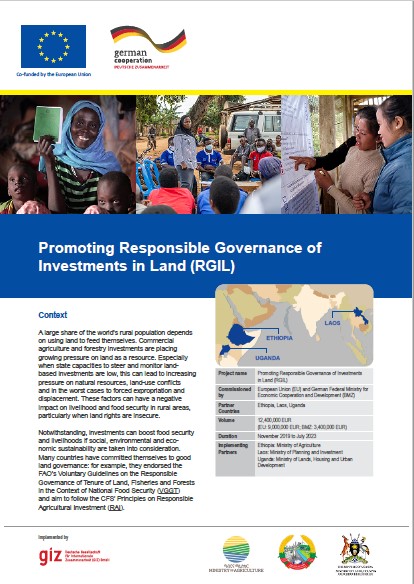Training of Trainers (ToT) on the dissemination of CSA practices and CIS toward increasing the productivity of target crops
Sustainable environmentally, economically viable, and socially acceptable ways are important factors in increasing food production and achieving food security. To achieve increasing food production, the capacity development of key stakeholders especially extension agents and youth farmers is of great necessity, toward increasing the adoption of climate-smart agricultural practices.
Training of Trainers in Rangeland Monitoring & Assessment: Integrating LandPKS, VegMeasure, and Traditional Methods
Effective rangeland management relies on precise monitoring and assessment of natural resources, offering insights into ecosystem structure and function. Standardized methods, consistently applied over time and space, are crucial for ensuring data quality across various applications. Achieving successful rangeland monitoring necessitates significant investments in time and human resources, emphasizing comprehensive training. This proficiency extends beyond professionals to academics, playing a pivotal role in education.
Scaling climate-smart agriculture for accelerated agri-food systems transformation in Africa
This publication was prepared by the staff of the African Union Development Agency - NEPAD in partnership with experts from the Accelerating Impacts of CGIAR Research for Africa (AICCRA) Project, The findings, interpretations, and conclusions expressed in this work do not necessarily reflect the views of AUDA-NEPAD.
The Role of ICARDA’s Germplasm Health Unit (GHU) in Improving Plant Health and Safeguarding the Biodiversity of Legume and Cereal Crops
In order to safeguard countries from quarantine risks (insect pests, pathogens, nematodes, parasitic weeds) associated with the movement of legume (faba bean, lentil, chickpea, grasspea) and cereal (wheat and barley) germplasm, ICARDA’s Germplasm Health Unit (GHU) follows a regulatory and quarantine program implemented in close collaboration with competent institutions where ICARDA has platforms for crop breeding, germplasm multiplication and evaluation and genetic resources exchange.
Network of CoPs between extensionists, scientists, and farmers to optimize capacity building: Elaboration and implementation of capacity development plan
As part of the process to strengthen the capacities of local stakeholders and facilitate the adoption of sustainable practices, from within the context of the Innovahubs a comprehensive training strategy was designed and put into action.
Can 2 + 2 make 5? From adding up to Intersectionality
The objective of this research is to shift participants away from potentially thinking of intersectional research as being additive, towards developing a shared understanding of intersectionality as about the ways identities combine to create specific sets of opportunities, and challenges, in an agri-food system. Taking an intersectional approach is a way of considering how interwoven dimensions of inequality affect groups of people (and individuals) in the context of a problem and can lead to constrained spaces for them to make and act upon decisions.
AICCRA 2023 Partnership Survey Results Report
Accelerating Impacts of CGIAR Climate Research for Africa (AICCRA) is a USD 60 million three-year project, funded by the World Bank and led by CIAT, with participating partners from seven countries: Ethiopia, Kenya, Ghana, Kenya, Mali, Senegal and Zambia. This report provides an overview of two Satisfaction Surveys that were disseminated to partners to gather their feedback on three of the intermediate Project Indicators (IPI), as laid out in the Project Implementation Arrangements.
Promoting Responsible Governance of Investments in Land (RGIL)
The RGIL project is part of the Global Programme Responsible Land Policy (GPRLP) and is implemented in Ethiopia, Laos and Uganda. RGIL aims to ensure that investments in land are productive, contribute to sustainable land management and respect the rights and needs of local populations, in particular vulnerable groups and women. The project is funded by the European Union and the German Federal Ministry for Economic Cooperation and Development (BMZ).
Women of the Land
The Support to Responsible Agricultural Investments (S2RAI) Project promotes internationally recognized principles and guidelines to ensure food and land tenure security for communities in the context of large-scale commercial land investment as well as strengthen the institutional frameworks and coordination structures at federal and regional levels in relations to responsible agricultural investment in Ethiopia.
LAND-at-scale Burundi
This one-pager provides details on the LAND-at-scale project in Burundi. This project is implemented by ZOA, VNG International and MiPAREC, and financed by the Ministry of Foreign Affairs via the Netherlands Enterprise & Development Agency.
LAND-at-scale Burkina Faso
This one-pager provides details on the LAND-at-scale project in Burkina Faso. This project is implemented by Nitidae, Observatoire National du Foncier Burkina Faso (ONF-BF), Oxfam Burkina Faso, and financed by the Ministry of Foreign Affairs via the Netherlands Enterprise & Development Agency.



